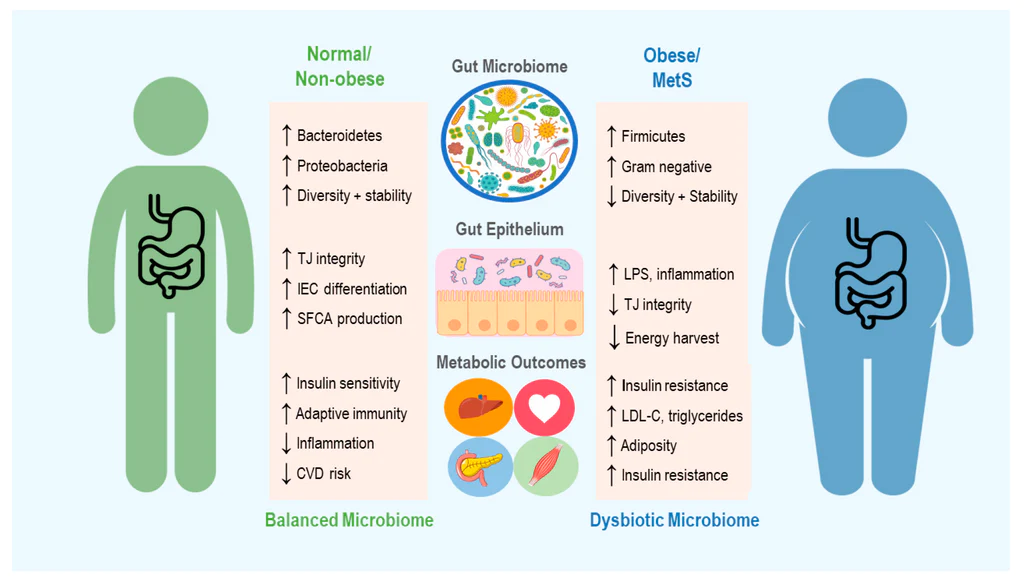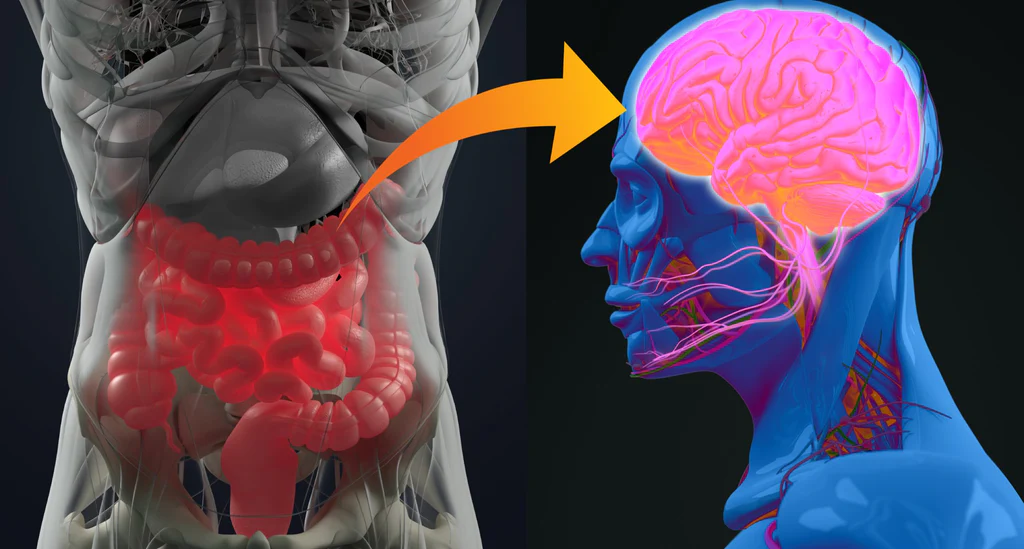Your gut is a delicate ecosystem of over 100 trillion organisms comprising funghi, bacteria, yeasts and other microbes. A poorly functioning microbiome can have serious consequences for your health. The following are 5 ways your health can be impacted by poor gut health ..
1. Poor nutrient absorption
An imbalanced microbiome will have an impact on nutrition absorption, meaning your body will not benefit from the full range of nutrients.
You may be following a healthy diet, but if you can’t absorb nutrients efficiently, health will be impacted.
There are around 40 trillion bacteria in your body, most of which are found in your gut, collectively known as your gut microbiome, and they’re incredibly important for overall health.
If your microbiome is compromised, your body's ability to absorb nutrients will result in a nutritional deficiency affecting your health, mood and wellness.
2. Weight gain

There is mounting evidence of poor gut health leading to weight gain.
The microbiome influences how your body stores fat, balances glucose, and affects your hunger hormone ghrelin which stimulates appetite.
Diet can significantly alter the microbiome in just a single day, and diet remains the biggest contributor to weight issues, even as it relates to a healthy microbiome, and how your body processes fat, nutrients, hormones, etc.
Maintaining a healthy gut is vital to anyone with weight management concerns.
3. Autoimmune diseases
Autoimmune disease occurs when your body's natural defense system can't tell the difference between your own cells and foreign cells, causing the body to mistakenly attack normal cells (sometimes called inappropriate response). There are more than 80 types of autoimmune diseases that affect a wide range of body parts, like tissues, organs, cells, etc.
This results in damage and inflammation that creates further problems.
Ironically it can often be inflammation that contributes to the development of autoimmune and allergic disorders, not the least of which can be caused by a microbiome imbalance.
Common autoimmune disorders include: lupus, rheumatoid arthritis, leaky gut, multiple sclerosis, and autoimmune thyroid disease.
4. Poor brain function and the gut-brain axis

The gut-brain axis (GBA) consists of bidirectional communication between the central and the enteric nervous system, linking emotional and cognitive centers of the brain with peripheral intestinal functions. Recent advances in research have described the importance of a healthy gut microbiome in influencing these interactions.
A healthy gut microbiome is vital to brain balance and preventing psychological disorders.
There are over a billion nerve endings in the GI tract. Scientists referring to this complex system of neurotransmitters as the enteric nervous system (ENS), or the human body's second brain.
Your ENS contains over 100 million neurons. This is more than both the spinal cord and peripheral nervous system, combined.
Your ENS can function independently without the brain. The brain doesn’t overly influence the gut, but the ENS does influence the brain by sending signals and creating most of the body’s serotonin (a chemical nerve cells produce). Serotonin is found mostly in the digestive system as well as the central nervous system. The interplay of chemicals and hormones between the brain, gut, and body can be affected by microbiome imbalance, and can lead to depression and anxiety.
The Gut-brain axis include emotional and cognitive functions. Evidence is emerging that the microbiome is observed to affect alzheimer patients, as well as children with autism, though more evidence and research is needed. However, research has shown a more established link between GBA and mood.
5. Cancer
Research is increasingly linking the development of cancer to poor gut health and compromised microbiome, leading to tumors and cancer.(1)
In research titled 'cancer-preventing attributes of probiotics' improper balance of microbes in the body have been linked to colorectal cancer, breast and liver, among others.(2)
Conclusion
Many studies have shown that an imbalance or disrupted microbiome is detrimental for health. If you search for optimal health and wellness or you want to reverse existing conditions then starting with a healthy gut is a priority.
Consuming a plant-based diet have been shown to benefit gut microbiome due to high fiber content.
Eating foods rich in polyphenols (compounds shown to reduce blood pressure, inflammation, oxidative stress and cholesterol). Some examples of foods rich in polyphenols are red wine, almonds, blueberries, broccoli, onions. PolyGreens®. green superfood powder is a supplement rich in polyphenols with added pre and probiotic.
Consuming prebiotic foods including whole grains, fruit and vegetables support the growth of beneficial bacteria like Bifidobacteria.(3) PrePlant® advanced prebiotic is a supplement that stimulates the growth of beneficial bacteria. Certain prebiotics have shown to reduce heart disease and type-2 diabetes.(4)
Increase your consumption of probiotics like fermented foods, kefir, yogurt or sauerkraut, or take a focussed supplement like ProPlant® advanced probiotic, which works in harmony with ProPlant.
Scientific references
1. https://pubmed.ncbi.nlm.nih.gov/20187714/
2. https://pubmed.ncbi.nlm.nih.gov/20187714/
3. https://www.ncbi.nlm.nih.gov/pmc/articles/PMC6041804/
4. https://pubmed.ncbi.nlm.nih.gov/25456608/



